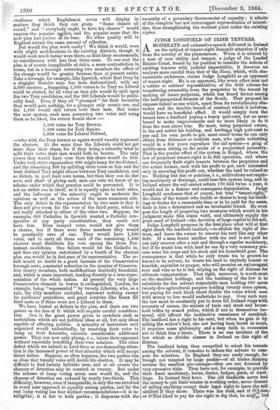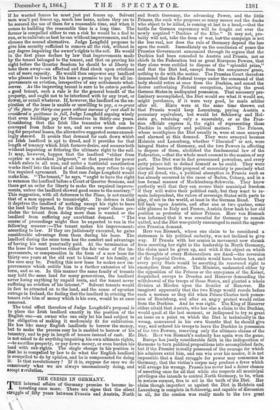JUDGE LONGFIELD ON IRISH TENURES.
AMODERATE and exhaustive speech delivered in Ireland on the subject of tenant-right demands attention if only- from the novelty of the phenomenon. When it is uttered by a man of rare ability and temper, a judge of the Landed Estates Court, forced by his position to consider the defects of existing tenures with judicial impartiality, it deserves an analysis more careful than that of the Times, which, with cha- racteristic unfairness, claims Judge Longfield as an opponent of tenant-right. He is an opponent, like every other man not a cottier or cottiers' representative, of the wild scheme for transferring ownership from the proprietor to the tenant by making all leases perpetual, which has found favour among the half-pauperized farmers of the South. That proposal he exposes indeed as one which, apart from its revolutionary cha- racter and the forcible breach of contract which it involves, would have no beneficial effect. It would simply tarn the tenant into a landlord paying a heavy quit-rent, but no more bound to make improvements and no more likely to do it than the man above him. He must, being perpetual owner, in the end sublet his holding, and having.a high quit-rent to pay and his own profit to get, must exact terms he can only obtain from dishonest or reckless men, who again subletting would in a few years reproduce the old system—a gang of middle-men sitting on the necks of a pauperized peasantry. That is the precise effect of the system in Bengal, where the law of perpetual tenant-right is in fall operation, and where one frequently finds eight tenants between the proprietor and the actual farmer, each with his profit to get, each interested only in screwing this profit out, whether the land be ruined or no. Nothing but rice or potatoes, i. e., cultivations not requir- ing machinery or drainage, could bear this system long, and in Ireland where the soil cannot return 170 fold twice a year, it would end in a famine and consequent depopulation. Judge Longfield condemns that of course, but true "tenant-right," the claim of the tenant who builds or drains to keep his build- ings or drains for a reasonable time or to be paid for the same, finds in him a determined and an invaluable friend. He even goes the length of proposing two measures which would in his judgment make this claim valid, and ultimately supply the great need of Ireland—the devotion of large capital to the soil. Judge Longfield proposes in the first place what will at first sight shock the landlord instinct,—to abolish the right of dis- tress, and leave the owner to recover his rent like any other debt. If a man trusts another with tea and is not paid he can only recover after a suit and through a regular machinery, but if he trusts him with land he can by a very summary pro- cess seize his crops and his stock and his household gear. The consequence is that while he only trusts tea to grocers he knows to be solvent, he trusts his land to anybody honest or knavish, capitalist or pauper, who will promise an extravagant rent and vote as he is bid, relying on the right of distress for- ultimate compensation. That right, moreover, is worth most on the smallest holdings, and the tendency of the law is to substitute for the solvent respectable man holding 500 acres twenty-five agricultural paupers holding twenty acres apieoe, but paying for each block about double the value which men. with money to lose would undertake to pay. Over such men the law must be constantly put in force till Ireland rings with, accounts of scenes, the seizure of tools and stock and house- hold trifles by armed police, which if not in themselves im- moral, still affront the instinctive conscience of mankind. The landlord has a right to his rent, but when he gets it by selling the widow's bed, she not having been heard in court, it requires some philosophy and a deep faith in economies not to think him a brute. There is no one incident of the- law which so divides classes in Ireland as this right of distress.
The landlord being thus compelled to select his tenants among the solvent, it remains to induce the solvent to com- pete for selection. In England they are ready enough, for bough not tempted by large profits—of all trades Arming returns the smallest per-centage—they are not deterred by very excessive risks. They have not for example, to provide their fixed machinery, barns, drains, hedges, gates, or dwel- lings. In Ireland they have. The old landlords never had the money to put their estates in working order, never dreamt of selling anything except their legal right to leave the soil c =tilled if they chose. There was the field, and if OA Hen or O'Niel liked to pay for the right to dig that, he migrar bu if he wanted fences he must just put fences up. Solvent men won't put fences up, much less barns, unless they are to be secured the use of them for a reasonable time, and when it comes to building the reasonable time is a long time. The farmer is compelled either to ran a risk he would be a fool to ran, or to cultivate as best he can without improvements, and he chooses the second alternative. Judge Longfield proposes to give him security sufficient to remove all the risk, without in any degree impairing the owner's rights to the soil. He would in the first place declare by law that improvements made by the tenant belonged to the tenant, and that on proving his right before the Quarter Sessions he should be at liberty to take them away—an effectual and final check upon evictions out of mere rapacity. He would then empower any landlord who pleased to insert in his lease a promise to pay for all im- provements on eviction, irrespective of any settlements what- soever. As the improving tenant is sure to be cetceris paribus a good tenant, such a rule is for the general benefit of the property, and ought not to be interfered with by any trust, or dower, or entail whatever. If, however, the landlord on the ex- piration of the lease is unable or unwilling to pay, a re-grant of the farm for thirty-one years without increase of rent shall be considered a quittance in full, Judge Longfield arguing wisely that even buildings pay for themselves in thirty-one years. Considering that the Irish like tenancies which can be conveyed from father to son, and are even now clamour- ing for perpetual leases, the alternative suggested seems exceed- ingly shrewd. It avoids that demand for cash down which an Irish landlord is apt to dread, and it provides for that length of tenancy which Irish farmers desire, and secures both without impairing or fettering the ultimate right to the soil. It may, however, happen that the landlord "either from caprice or a mistaken judgment," or that passion for power which exists in all men, and under a territorial constitution works itself into the blood of all landlords, may refuse to sign the required agreement. In that case Judge Longfield would make him. "The tenant," he says, "ought to have the right to summon the landlord before a Court of Quarter Sessions, and there get an order for liberty to make the required improve- ments, unless the landlord showed good cause to the contrary." This suggestion, with all deference to the Times, is not exactly that of a man opposed to tenant-right. Its defence is that it deprives the landlord of nothing except his right to have the land badly farmed, for the thirty-one years' clause pre- cludes the tenant from doing more than is wanted or the landlord from suffering any exorbitant demand. " The course of proceedings might then be expected to run in the following manner :—The tenant makes his improvements according to law. If they are judiciously executed, he gains considerable advantage from them during his lease. The landlord during the same term has the comfort and advantage of having his rent punctually paid. At the termination of the lease the tenant receives either the fair value of the im- provements, or compensation in the form of a new lease for thirty-one years at the old rent to himself or his family, as the case may be. Pending this new lease he makes new im- provements which entitle him to a further extension of his term, and so on. In this manner the same family of tenants may hold the same land for many generations, the landlord never losing anything by unpaid rents, and the tenant never suffering an eviction of his interest." Solvent tenants would in fact be attracted on to the land, and the cause of agrarian outrage in Ireland, the feeling that the landlord in evicting the tenant robs him of money which is his own, would be at once removed.
The total effect therefore of Judge Longfield's proposal is to place the Irish landlord exactly in the position of the English one—an owner who can only let his land subject to the obligation of making it moderately fit for cultivation. He has like many English landlords to borrow the money, but to make the process easy he is enabled to borrow of his tenantry, and to pay in length of tenure instead of cash. He is not asked to do anything impairing his own ultimate rights, —to sacrifice property, or pay down money, or even burden his land with sub-rights. The single change in his position is that he is compelled by law to do what the English landlord is compelled to do by opinion, and he is compensated for doing it. Is that revolutionary ? If it is, suppose for once we do consciously what we are always unconsciously doing, and accept rzivolution.































 Previous page
Previous page